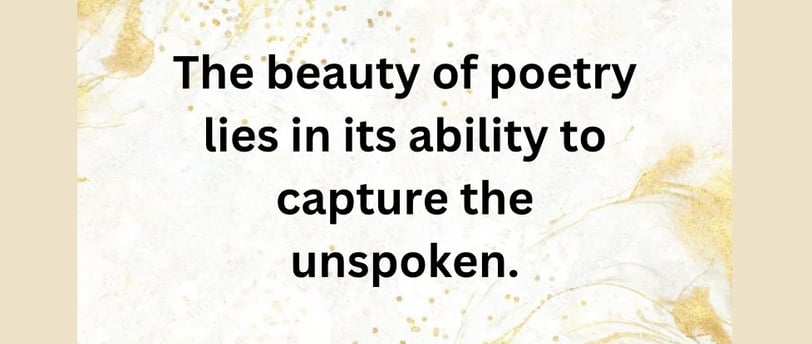The Unspoken Truth: Understanding the Beauty of Poetry
A poet watched the rain, feeling emotions too deep for words. As the drops fell, the words came, capturing love, loss, and hope in a few simple lines. Poetry turns silence into meaning—what will your heart speak today?
POETRY REFLECTIONS
✏️ T.T. Dayoff


Understanding the Beauty of Poetry
The assertion that "the beauty of poetry lies in its ability to capture the unspoken" conveys a profound appreciation for the art form. At its core, this statement speaks to poetry's unique capacity to articulate thoughts, feelings, and experiences that often elude verbal expression. While everyday communication frequently adheres to the constraints of language, poetry transcends these limitations, enabling a profound exploration of the complexities of the human experience.
The Role of Emotions in Poetry
One of the most significant aspects of poetry is its role as an emotional conduit. Poets harness language in innovative ways, crafting verses that resonate with readers on a deeply personal level. Through imagery, metaphor, and rhythm, poems can evoke feelings that might go unnamed in standard conversations. This emotional depth allows poetry to capture nuances of sentiment, ranging from joy to sorrow, love to pain, that might otherwise remain unarticulated in our daily lives. The beauty derived from this ability to convey the unvoiced emotions forms a cornerstone of why poetry endears itself to both writers and readers alike.
The Importance of Poetic Expression
Understanding the importance of poetry as an expressive medium unveils its broader societal relevance. In a world where many individuals struggle to communicate their thoughts and experiences, poetry acts as a liberating force, giving voice to the voiceless. The written word becomes a sanctuary, where complex feelings can be explored freely and authentically. By bridging the gap between the spoken and the unspoken, poetry encourages vulnerability and connection among readers, fostering empathy and shared understanding across diverse human experiences.
This connection to the unspoken extends not just to personal experiences but also to collective societal narratives. Many poets focus on social issues, transcending personal revelations to address collective struggles, such as injustice, inequality, or cultural identity. Through the power of poetic language, they capture the essence of collective emotions that may remain unrecognized or ignored, amplifying voices that demand attention and acknowledgment.
In conclusion, recognizing that "the beauty of poetry lies in its ability to capture the unspoken" prompts a deeper appreciation of poetry as a vital art form. It encourages a commitment to understanding and celebrating the emotional landscapes that define our lives, reminding us that while words may often fail to convey our innermost truths, poetry can serve as the bridge between silence and expression.
Let’s Connect
contact@paper2press.com
© 2024. All rights reserved.
Thank you for supporting this small business.
